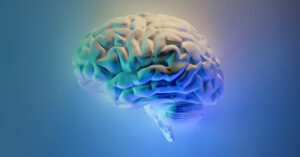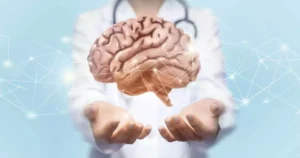Depression is a complex mental health condition that affects millions of people worldwide. While its symptoms and effects are well-known, understanding how depression affects the brain is crucial for comprehending the full impact of this condition. .
In this comprehensive guide, we will explore the intricate ways in which depression affects the brain, delving healthy brain structure, function, and neurotransmitters. By gaining a deeper understanding of these effects, we can better appreciate the challenges faced by those living with depression and the importance of effective treatment and support.
What Is Depression?
Before examining how depression affects the brain, it's essential to define what depression is. Depression, also known as major depressive disorder (MDD), is a mood disorder characterized by persistent feelings of sadness, hopelessness, and a lack of interest or pleasure in activities. It can lead to various emotional and physical problems, impacting daily functioning and overall quality of life.
The Basics of Brain Structure and Function
To understand how depression affects the brain, it's helpful to have a basic understanding of brain structure and function. The brain consists of several regions and structures, each playing a specific role in regulating mood, emotions, and cognitive processes. Key areas involved in depression include:
- The Prefrontal Cortex: Responsible for decision-making, planning, and regulating emotions.
- The Hippocampus: Involved in memory formation and emotional regulation.
- The Amygdala: Plays a crucial role in processing emotions, particularly fear and pleasure.
How Depression Affects The Brain Structure
Depression can lead to significant changes in brain structure, impacting various regions and their functions. Here are some of the most notable structural changes associated with depression:
1. Shrinking of the Hippocampus
One of the most well-documented effects of depression on the brain is the shrinking of the hippocampus. The hippocampus is essential for memory formation and emotional regulation. Chronic stress and high levels of cortisol, a stress hormone, can damage this area, leading to a reduction in its size. This shrinkage can result in memory problems and difficulties in regulating emotions, further exacerbating the symptoms of depression.
2. Changes in the Prefrontal Cortex
The prefrontal cortex, responsible for higher-order functions such as decision-making and emotional regulation, also undergoes changes in individuals with depression. Studies have shown that the prefrontal cortex can become less active and even shrink in size. This reduction in activity and volume can impair an individual's ability to make decisions, control impulses, and regulate emotions effectively.
3. Enlargement of the Amygdala
In contrast to the shrinkage observed in the hippocampus and prefrontal cortex, the amygdala often becomes enlarged in individuals with depression. The amygdala is involved in processing emotions, and its increased size and activity can lead to heightened emotional responses and sensitivity to negative stimuli. This can result in individuals experiencing more intense feelings of sadness, fear, and anxiety.
How Depression Affects Brain Function
In addition to structural changes, depression also affects how the brain functions. These functional changes can influence various aspects of cognition, emotion, and behaviour.
1. Disruption in Neurotransmitter Balance
Neurotransmitters are chemical messengers that play a crucial role in transmitting signals between nerve cells in the brain. Depression is often associated with imbalances in key neurotransmitters, including:
- Serotonin: Often referred to as the “feel-good” neurotransmitter, serotonin helps regulate mood, sleep, and appetite. Low levels of serotonin are commonly linked to depression, leading to feelings of sadness and irritability.
- Dopamine: This neurotransmitter is involved in reward and pleasure pathways. Reduced dopamine levels can result in anhedonia, a loss of interest or pleasure in previously enjoyed activities.
- Norepinephrine: Responsible for the body's “fight or flight” response, norepinephrine helps regulate alertness and energy levels. Imbalances in norepinephrine can contribute to feelings of fatigue and difficulty concentrating.
2. Impaired Communication Between Brain Regions
Depression can disrupt the communication between different regions of the brain. Functional connectivity, which refers to the coordinated activity between brain regions, is often altered in individuals with depression. For example, the communication between the prefrontal cortex and the amygdala can become dysregulated, leading to difficulties in regulating emotions and responding appropriately to stress.
3. Altered Brain Activity Patterns
Brain imaging studies have revealed that individuals with depression often exhibit altered patterns of brain activity. For instance, there may be increased activity in brain regions associated with negative emotions and decreased activity in areas involved in positive emotions and reward processing. These changes can contribute to the persistent feelings of sadness and lack of pleasure experienced by those with depression.
The Role of Inflammation
Recent research has highlighted the role of inflammation in how depression affects the brain. Chronic inflammation can influence brain function and contribute to the development of depression. Inflammatory markers, such as cytokines, can cross the blood-brain barrier and affect neurotransmitter systems, brain function, and behaviour.
- Inflammatory Response: Chronic stress and other factors can trigger an inflammatory response in the body. This inflammation can affect the brain, leading to changes in neurotransmitter function and brain structure.
- Impact on Neurogenesis: Inflammation can inhibit neurogenesis, the process by which new neurons are formed in the brain. This inhibition can contribute to the structural changes observed in depression, such as the shrinkage of the hippocampus.
The Impact of Chronic Stress

Chronic stress is a significant factor in how depression affects the brain. Long-term exposure to stress can lead to elevated levels of cortisol, the body's primary stress hormone. Elevated cortisol levels can have several negative effects on the brain:
- Hippocampal Damage: Chronic stress and high cortisol levels can damage the hippocampus, leading to shrinkage and impaired function.
- Prefrontal Cortex Impairment: Prolonged stress can also affect the prefrontal cortex, reducing its ability to regulate emotions and make decisions effectively.
- Amygdala Hyperactivity: Chronic stress can increase the activity and size of the amygdala, contributing to heightened emotional responses and sensitivity to stress.
The Impact of Depression on Cognitive Function
Depression can significantly impact cognitive function, affecting memory, attention, and decision-making processes. These cognitive impairments can be a result of the structural and functional changes in the brain associated with depression.
1. Memory Problems
As previously mentioned, the shrinkage of the hippocampus can lead to memory problems. Individuals with depression may experience difficulties with both short-term and long-term memory, making it harder to retain and recall information.
2. Impaired Attention and Concentration
Depression can also impair attention and concentration, making it challenging to focus on tasks or maintain sustained attention. This can impact daily functioning and productivity, further contributing to feelings of frustration and helplessness.
3. Decision-Making Difficulties
The changes in the prefrontal cortex associated with depression can lead to difficulties in decision-making. Individuals may struggle with making choices, solving problems, and controlling impulses, which can affect various aspects of their lives, including work, relationships, and personal goals.
Treatment and Management of Depression
Understanding how depression affects the brain underscores the importance of effective treatment and management. Several approaches can help mitigate the effects of depression on the brain and improve overall mental health.
1. Medication
Antidepressant medications can help restore the balance of neurotransmitters in the brain, alleviating symptoms of depression. Common types of antidepressants include:
- Selective Serotonin Reuptake Inhibitors (SSRIs): These medications increase the levels of serotonin in the brain by inhibiting its reuptake.
- Serotonin-Norepinephrine Reuptake Inhibitors (SNRIs): These medications increase the levels of both serotonin and norepinephrine.
- Tricyclic Antidepressants (TCAs) and Monoamine Oxidase Inhibitors (MAOIs): These older classes of antidepressants can be effective but may have more side effects.
2. Psychotherapy
Psychotherapy, or talk therapy, can help individuals with depression understand their thoughts, feelings, and behaviours. Cognitive-behavioural therapy (CBT) is particularly effective in treating depression by helping individuals identify and change negative thought patterns and behaviours.
3. Lifestyle Changes
Making lifestyle changes can also play a significant role in managing depression and improving brain health:
- Regular Exercise: Physical activity can rid depression fast and promote the release of endorphins, improving overall mental health.
- Healthy Diet: A balanced diet rich in nutrients can support brain function and overall well-being.
- Adequate Sleep: Ensuring sufficient and quality sleep is crucial for brain health and emotional regulation.
4. Stress Management
Learning to manage stress effectively can help reduce the impact of depression on the brain. Techniques such as mindfulness meditation, yoga, and deep breathing exercises can promote relaxation and reduce stress levels.
Conclusion: The Importance of Understanding Depression and Brain Health
Understanding how depression affects the brain is crucial for recognising the profound impact this condition can have on an individual's life. By exploring the structural and functional changes in the brain associated with depression, we gain insight into the challenges faced by those living with this condition.
Effective treatment and management strategies, including medication, psychotherapy, lifestyle changes, and stress management, can help mitigate the effects of depression on the brain and improve overall mental health. By prioritising mental health and seeking appropriate support, individuals can navigate the challenges of depression and work towards a healthier, more fulfilling life.



